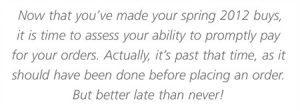maria Zampini — January 1, 2012
Trade shows are in full swing. We’re all a grippin’ and a grinnin’, as I call it. And while it is enjoyable to meet and greet old and new customers, we are all at trade shows for one or two basic reasons: to buy or sell product.
greet old and new customers, we are all at trade shows for one or two basic reasons: to buy or sell product.
Holiday and economic indicators are looking more promising than they have in years. Hopefully that increased buying trend continues at the trade shows and, more importantly, in spring when consumers are out in full force. But one of the age-old business challenges we face is what happens after the sale – namely, accounts receivable and accounts payable.

I know the topic isn’t new, however, I believe we can all use a friendly reminder especially if it helps us during these overwhelmingly stressful times. You’ve likely heard the saying, “A lack of planning on your part does not constitute an emergency on my part.” If in business we fail to plan, we plan to fail. And when we don’t adequately plan our purchasing, it has a trickle-down effect; either for our vendors when we can’t pay on a timely basis, or for us when our customers don’t pay as scheduled.
In an economic downturn, there are many nurseries or green goods suppliers who are more than happy for your business; quite honestly, they’re taking orders from anyone and everyone, regardless of whether the buyer is considered an A, B or C grade customer. Don’t misunderstand me – you need all size customers. Pennies always add up to dollars. What I’m talking about here is how promptly customers pay their bills, as cash flow is king.
There are even some people who will skip from vendor to vendor knowing they can’t pay and can “afford” to burn some bridges. Some will, however, be forced to switch vendors because for them the few nickels they save can mean life or death – and at this point, they have no other choice. There are also those vendor-customer combinations that are loyal to each other despite slow pay or slightly higher costs. They talk frequently and work through the rough patches together, as a team.
I think our industry has gone to just-in-time buying for many reasons, but perhaps most of all because this way people are assured they can only buy and pay for what they can afford. Wow, just think: What shape would our country be in if even more of us, personally and professionally, had taken that path instead of the enticing credit card lane?
But, what goes up, must come down. The thing is, this economic situation isn’t going to last forever. And when things do fall back in to line, in my opinion more vendors are going to be able to pick and choose whom they do business with. Thus I contend that right now is the time you’d best be taking care of that customer or vendor who takes care of you! If you have a vendor or customer you want to stay married to in the good times, you need to be taking care of them in the bad times as well!
Now that you’ve made your spring 2012 buys, it is time to assess your ability to promptly pay for your orders. Actually, it’s past that time, as it should have been done before placing an order. But better late than never! If you didn’t discuss terms up front, you’d better double check your order terms now. If you need credit or extended terms, ask for them, just not at the 11th hour. What’s the worst a vendor can say – no?
To vendors, I suggest updating your credit applications if you haven’t done so in a while, and be sure you have current, signed apps on file. There is nothing worse than calling a customer upon shipping to “remind” them their order is coming COD and hearing “I didn’t know it was COD.” This year, call customers earlier than ever before so you can resolve any dispute prior to the truck being loaded – and while you still have options.
Over the years one thing that absolutely got me were customers who acted like they were entitled to extended terms beyond reason. If you choose to do business with customers, like cities, that will not pay for 120+ days, don’t ass-u-me that your vendors will gladly wait, especially if you don’t ask for those extended terms beforehand. Vendors are not your lending institution.
Look, even normally good paying customers can have a hard time paying promptly. But if, for whatever reason, you can’t pay your bill, then I can’t emphasize enough how crucial communication between you and your vendor is. Most people are willing to work with you, if you just talk to them. For some, I think non-communication is simply an issue of natural procrastination, or perhaps pride; they don’t want to admit they need a little help. We all need help at some time or another and we shouldn’t be ashamed to ask for it.
If your vendor calls for payment, even if you don’t have a concrete answer or the answer you know they’ll be looking for, at least take the call or return their call promptly. Don’t avoid them. They will respect you more for your honesty.
Everyone has different philosophies on business. But in my experience, which was learned the hard way, when you’re a vendor trying to collect money, you’re more likely to succeed with honey then you are with vinegar. If the business owner isn’t the one making the collection calls, then you should really know what kind of impression your A/R person is leaving with your customer.
When it comes to A/R or A/P, or just business in general, we may need to stop and think, am I treating this customer the way I’d like to be treated? And if not, consider this: You may think you don’t really need that customer today, but will you need them tomorrow?
Maria Zampini is the president of UpShoot LLC. Her company’s focus is “living, sharing and supporting horticulture” through new plant introduction representation including LCN Selections. She can be reached at [email protected], and her website is www.upshoothort.com.